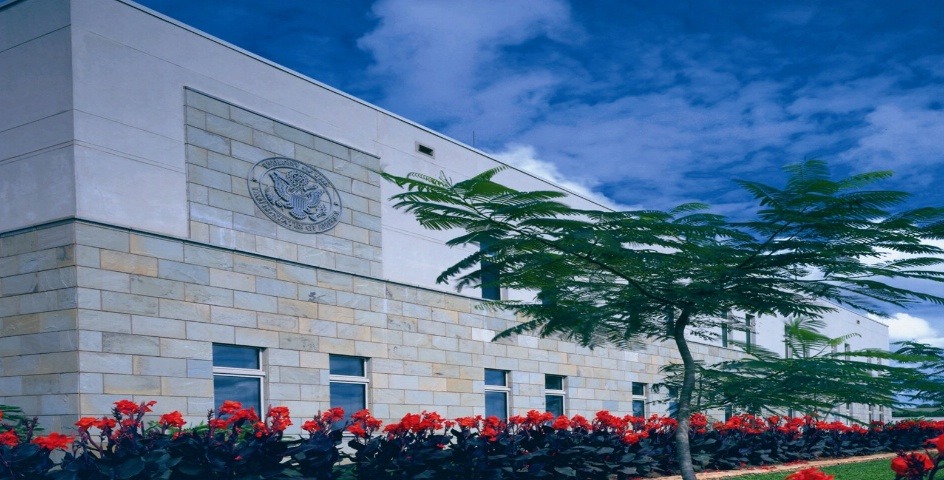
America’s Latest Meddling In Africa
The Ugandan government accused the American Ambassador of meddling in the country’s latest elections after she unsuccessfully attempted to visit failed opposition candidate Bobi Wine who’s presently under house arrest. Long-serving leader Yoweri Museveni officially won re-election for a sixth term in office with 58.64% of the vote while Wine earned 34.83%. Allegations of fraud and other irregularities have routinely plagued Museveni, but they used to be largely ignored by the US because of his country’s prior status as one of the US’ top regional allies. As a case in point, Uganda invaded the Democratic Republic of the Congo (DRC) and played a leading role in its back-to-back civil/international wars which altogether claimed an estimated over 5 million lives, mostly from disease and starvation. Recently, however, he’s sought to “balance” his foreign policy by moving much closer to China, which earned him America’s diplomatic wrath.
Who’s Bobi Wine?
I published a comprehensive Hybrid War risk assessment on Uganda in December 2016 which can be read in full at the Oriental Review online journal. It blends my unique contribution to Hybrid War theory with the evolving geopolitics of that country and the larger East African region against the backdrop of the New Cold War between the US and China. All motivations for American meddling in Uganda are attributed to Washington’s desire to chastize its wayward ally for recently embracing the US’ strategic rival after Kampala joined Beijing’s Belt & Road Initiative (BRI). In connection with the most likely destabilization scenarios, I subsequently published two analyses on Bobi Wine in late 2018, the first of which was more extensive and is titled “Understanding The Unrest In Uganda: Hybrid War Or Heartfelt Opposition?” while the second is much more brief about how “Bobi Wine Is An American Puppet, But People Follow Him For A Reason”.
Color Revolution Schemes
Those pieces made the important point that there exists genuine grassroots opposition to Museveni among the three-quarters of Ugandans who are under the age of 30 (the median age is actually only 15). It’s therefore grossly inaccurate to claim that every manifestation of anti-government sentiment in Uganda is due to an American Hybrid War plot, though different US actors definitely seek to exploit preexisting divisions in society in order to advance their interests. The authorities blocked the world’s top social media platforms in the run-up to the elections after Facebook removed accounts allegedly linked to the Ministry of Information, which Kampala regarded as illegal interference in its domestic political affairs. There’s a certain logic in their decision too when considering that the core mechanics of all Color Revolutions depend on such networking sites as I explained in my exposé of this weaponized phenomenon for the Center for Syncretic Studies in December 2014. From Kampala’s perspective, considering rising political tensions with the US, it was better to be safe than sorry.
The Failure Of A “Phased Leadership Transition”
That said, while keeping in mind social media meddling and the provocative attempt by the American Ambassador to meet Wine under house arrest, it must be said that the US isn’t really interfering all that much in Uganda. Both cited examples are part and parcel of what the US routinely does nowadays against most non-Western democracies in the Global South and aren’t exclusive to Uganda itself, though they’re still unwelcome because they undermine their targets’ sovereignty. There’s no doubt that the US aspires to carry out regime change in Uganda, but it’s unclear exactly how far it’ll directly go in pursuit of that strategic objective. Ideally, from Washington’s perspective, there would be a “phased leadership transition” carried out through the democratic process as is the preferred norm whenever possible. I explained how this works more in detail in my January 2018 analysis about how “Military Intelligence Has Weaponized Democracy Worldwide”, which discusses the motives behind this strategy and the means through which it’s most often advanced.
The Ugandan Scenario
In the Ugandan context, this can most realistically (though not necessarily likely) play out through a strategy of tension which brings society past the breaking point. The US doesn’t recognize the full legitimacy of Museveni’s electoral victory for the earlier mentioned reasons related to pervasive fraud accusations, and the Ambassador’s attempt to visit Wine under house arrest speaks to Washington’s tacit support of him as a potential Guaido-like figure. The intention seems to be to provoke the opposition leader’s followers into carrying out a doomed-to-fail Color Revolution attempt for the purpose of triggering a characteristically brutal crackdown against the country’s youth. This in turn could have the potential to catalyze a self-sustaining cycle of unrest which might eventually lead to divisions within the country’s “deep state”, perhaps even facilitated by targeted sanctions in response to rising civil violence. It’s unclear to what extent the US will push this scenario, or even whether it would succeed if sincerely attempted, but just that it seems like the most plausible plan.
Hybrid War Variables
Of course, since Hybrid Wars are usually waged with the intent of promoting regime tweaking (concessions), regime change (self-explanatory), or regime reboot (far-reaching constitutional reform), the pressure coming from this potential campaign might be alleviated in the event that one or a combination of those three objectives is reached. Again, it must be emphasized that there aren’t any clear indications of just how serious the US is about going through with this scenario, but just that it’s become increasingly obvious that it’s fed up with Museveni and is using the latest elections as a pretext to meddle more in Uganda’s domestic affairs. The preexisting divisions in society, especially between the youth and the older generation, makes it comparatively easier for the US to indirectly shape events depending on the reaction of the security services. This rising tension between former allies Washington and Kampala, it should be remembered, is due to the latter’s growing ties with Beijing and unwillingness to implement a “phased leadership transition” through elections.
Concluding Thoughts
All in all, there’s no doubt that the US is meddling in Uganda, but the degree to which it’s doing so is less direct than in other cases such as Syria for instance. Thus far, America is only providing a platform for organizing Color Revolutions on social media and its Ambassador is bestowing tacit legitimacy upon Bobi Wine as a “political prisoner” in Washington’s eyes who might eventually be deemed the “Ugandan Guaido”. It must be emphasized, however, that there are plenty of legitimate reasons having nothing whatsoever to do with the US for why so many Ugandans are upset with incumbent President Museveni. They don’t care about him turning his back to America in favor of China since quite a few of them are simply dissatisfied with the state of their country’s democracy and others are just fatigued at seeing him in power for three and a half decades already. This state of affairs makes it comparatively easier for the US to indirectly catalyze a self-sustaining cycle of unrest, though America’s success will largely depend on the reaction of the security services and civil society.

Leave a Reply